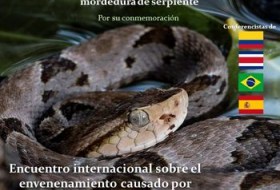News
Researchers from Unicauca and the Nueva Granada Military University hold an event on snakebite poisoning in Latin America
The virtual event will take place on September 19, 2020, seeks to motivate research from trans-disciplinary work to establish strategies that enhance community participation, the response capacity of health services, alliances to improve the availability of resources and guarantee treatments effective and safe.
In commemoration of the International Snake Bite Awareness Day, the GIHT Herpetological and Toxicological Research Group and the Bioterio CIBUC Bioterio Biomedical Research Center, attached to the Department of Biology of the Faculty of Natural, Exact and Educational Sciences, and The Nueva Granada Military University with the Research Group on Radiological, Biological and Chemical Agents - Faculty of Medicine and Health Sciences organize and carry out the International Meeting on poisoning caused by snakebite in Latin America 2020: From scientific research in toxinology to the social appropriation of knowledge.
“The World Health Organization decreed that September 19 be celebrated worldwide because it is a public health problem that generally affects tropical countries. There is much ignorance about this tropical disease, but it is a priority, given that there are many cases worldwide and in Colombia there are an average of 6000 to 7000 cases per year. In addition to that, there is a lot of ignorance on the part of medical personnel to respond to this type of accidents, hence these initiatives arise because in order to understand this type of poisoning, it is necessary to know the source of the poison, since many times it is not even distinguished between poisonous and non-poisonous snakes. Hence the need to motivate research and training in this field” explained professor Jimmy Alexander Guerrero Vargas, head of the Biology department and director of the Herpetological and Toxicological Research Group (GIHT).
The researcher professor invited to participate health professionals, biological sciences, agricultural sciences, any professional who in their practice has to do with accidents by poisonous animals or may suffer from this type of accidents and the community in general, since the subject must be approached from an inter-disciplinarity. “Biology plays a fundamental role with its natural research in terms of knowing taxonomy, ecology, physiology and molecular biology to be able to understand these poisons and provide a better clinical treatment. Also civil works professionals who enter forests to build and professionals in the agricultural sector who are in constant work with the field need knowledge and especially the communities so that species of snakes are not continued to be killed indiscriminately, the event seeks raise awareness among professionals and non-professionals ”.
The free event, which requires prior registration (Registration link) will be held on September 19 and will offer 15 conferences that address topics such as proteomics of poisons, pharmacology of poisons, implications of the delay in going to healthcare centers, natural substances with protective potential against snake venoms, approach to snakebite envenomation in Latin America, clinical approach, use of anti-venom and strategies for education and prevention of this type of accidents.
“Poisons of animal origin are the real gold mine because they are molecules with pharmacological potential. The biggest example of this is captopril which is a drug used to control arterial hypertension and this is simply a toxin purified from the venom of bothrops jararaca which has geographic distribution in Brazil. Likewise, research is done looking for biotechnological potentials in the molecules that gives added value and contributes to the conservation of the species as it helps to control or diagnose human diseases ", adds the Teacher.
The University of Cauca, through the GIHT Herpetological and Toxicological Research Group and the Bioterio CIBUC-Bioterio Biomedical Research Center, has a large community commitment as they are constantly contacted by the community to attend to this type of case.
In this way, it seeks that governments address the problem of snakebite poisoning, from trans-disciplinary work: Biology, Ecology, Chemistry, Medicine, among other disciplines, in order to establish strategies to enhance community participation, strengthen capacity response of health services, promote alliances to improve the availability of resources and guarantee the availability of effective and safe treatments.
More reports
Center for Continuing, Open and Virtual Education
Email: cecav@unicauca.edu.co


